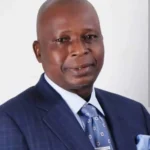The Commandant, National Defence College, Rear Admiral Olumuyiwa Olotu, has warned that corruption will kill Nigeria if nothing is done to address the menace.
He described corruption as a complex global challenge interrupting the progress of nations in all spheres of life. He noted that regions and nations had incurred huge losses that involved lives and property owing to corrupt practices.
Speaking on Monday in Abuja at a seminar titled ‘The Cycle of Corruption: Ripple Effects and Remedies’, organised by the Centre for Strategic Research and Studies of the NDC, he stated that corruption was at a rapid increase and had warped the economies of many countries, including Nigeria, leading to poor governance.
The seminar is in commemoration of the Global Anti-Corruption Day with the theme ‘Uniting the World Against Corruption’.
Don’t sell Produce To Hoarders, Sheikh warns Farmers
FACT CHECK: Did police arrest intern who cleared MTN users’ debts?
He therefore called for collective efforts of people and institutions in the fight against corruption in Nigeria.
“This has once again brought to the fore the fact that if we do not kill corruption, corruption will kill Nigeria,” he added.
Olotu commended the Federal Government for its efforts to eradicate the menace, saying the complexity of corruption and how to address it involved collective efforts both within and outside government.
He said the NDC had over the years been facilitating and driving the process of finding strategic and sustainable solutions to problems confronting the nation. He added that the college was determined to set in motion activities that could yield positive results in the fight against corruption.
Olotu expressed confidence that the seminar would provide stakeholders the opportunity to share ideas and experiences with a view to proffering workable recommendations towards the fight against the menace.
The Secretary, Economic and Financial Crimes Commission (EFCC), Mr Muhammad Hammajoda, said there was the need for cooperation among anti-graft agencies to achieve better results in the fight against corruption.
He added that poor attitude and mindset were responsible for the heightened corruption in the country. He added that honesty, transparency and accountability were required to curb the menace.
Also, the Acting Chairman, Code of Conduct Bureau (CCB), Mr Murtala Kankia, said fighting corruption required collaborative efforts.
Kankia said the decay in the nation’s educational system and the health sector, as well as the lack of development and progress, was largely due to corruption.
He said there must be attitudinal change on the part of individuals to win the war.
The Secretary, Independent Corrupt Practices and other Related Offences Commission (ICPC), Mr Clifford Oparaodu, said corruption had remained the bane of development all over the world.
Represented by the Deputy Director, Education, John Odey, the ICPC secretary said wars and terrorism around the globe, including Nigeria, were because of corruption.
Oparaodu added that the backwardness, political, economic and social dislocations being experienced in Nigeria and other parts of the world were also as a result of corruption.
He said the ICPC had continued to develop strategies to ensure that the menace of corruption in Nigeria was tackled with the seriousness it deserved.
The Chief Executive Officer, Nigeria Financial Intelligence Unit, Modibbo Tukur, said the unit was committed to supporting stakeholders in the fight against corruption, money laundering and terrorism financing.
Tukur, who was represented by the unit’s Associate Director of Intelligence and Investigation, Mrs Shotunde Biola, said the NFIU had introduced a number of measures to stem corruption in Nigeria.
He added that the unit was working in close cooperation with over 165 countries to collate intelligence to stop corrupt practices in the financial system.
The Lead Discussant and Group Board Chairman of YIAGA Africa, Hessein Abdul, said the seminar would look at major drivers of corruption, key challenges and progress made in the fight against corruption.
Abdul said corruption had continued to thrive in spite of the establishment of different institutions to fight it. He added that there was the need to ask the right questions to see why Nigeria is where it is.
According to him, the challenge is not about the institutions fighting corruption, but largely about the character of governance.

 Join Daily Trust WhatsApp Community For Quick Access To News and Happenings Around You.
Join Daily Trust WhatsApp Community For Quick Access To News and Happenings Around You.


